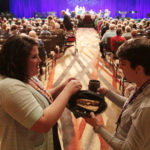Get facts in order
Where in the only $1.1 trillion in discretionary spending in the U.S. budget do you think you can find the “$2.5 trillion over 10 years” or $250 billion per year, the Baptist Standard article (“Note to your church: Raise $714,000/year to offset Trump budget cuts”) says would be required of churches to make up for the cuts in the services that “help hungry, poor and other vulnerable people” proposed in the Trump budget?
This $1.1 trillion is the total discretionary spending. The four sectors that probably contain most of the funds targeted to help those properly considered poor, hungry and vulnerable might add up to approximately that amount. But you must realize these sectors also include funds going to the total U.S. population. The great majority of U.S. citizens can’t be categorized as “hungry, poor and other vulnerable.” That’s clearly the case for allocations to veterans, those of us on Medicare and those currently being educated.
I see nothing wrong with an editor using an outside source to help make a point. But it seems to me it would be a really good idea to make sure the outside source has its facts in better order than Bread for the World did in the article you chose to highlight.
Ide Trotter
Duncanville
Defining important words
The editorial “Now is the time to reclaim ‘patriotism'” is a needed reminder of the meaning of the term. The word has been cheapened so much it has lost its original meaning.
Sign up for our weekly edition and get all our headlines in your inbox on Thursdays
Many seem to think it is all about flying the flag, wearing a flag lapel pin or item of clothing made in a flag likeness or saying the Pledge of Allegiance. Even serving in the military or wearing a law enforcement uniform doesn’t necessarily mean “patriotism.” A lot of people weren’t privileged to serve for a variety of reasons, yet these folks have demonstrated patriotism in many ways, such as paying their taxes and serving others.
Another word that has been changed dramatically is “conservative.”
At one time, it meant someone who wanted to leave the country in at least as good a condition as when he/she arrived here. When I was in the 4H and FFA at Woden High School in the early 1950s, we learned about and practiced planting trees, contour plowing, terraces, cover crops. We learned how to repair equipment so it would last.
Now, being “conservative” means doing anything that doesn’t cost us anything if it provides more money for us, trashing regulations that enhance safety and health, ignoring infrastructure needs. The watchword is “I’ve got mine, and too bad about you.”
I cringe when I hear the term “Conservative Christian,” as it often means a preacher who is up to his neck toadying to a certain group of politicians to gain money.
Carl Hess
Ozark, Ala.














We seek to connect God’s story and God’s people around the world. To learn more about God’s story, click here.
Send comments and feedback to Eric Black, our editor. For comments to be published, please specify “letter to the editor.” Maximum length for publication is 300 words.